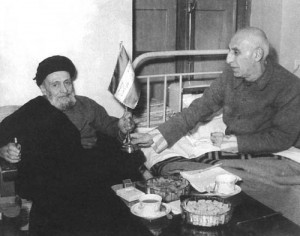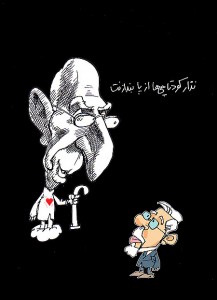
2055 GMT: Sports Section. Football star Ali Karimi, who was released by his club Steel Azin this week, apparently for drinking water during training and thus breaking the daylight fast of Ramadan,
was in the stadium tonight for Steel Azin's match with Kerman Copper. He was applauded by the crowd.
2035 GMT: Speech Round-Up (Opposition Edition).
Rah-e-Sabz has more on
Mir Hossein Mousavi's latest statement that 30 years of the Islamic Republic are being challenged to "save the cobwebs of tyrants". And the website summarises
Mehdi Karroubi's on-line chat with readers: he will participate in a Qods Day rally in September, for which planning is under way. He said that the current Government is not religious nor a republic, and the Iranian people will have decide about a a religious or secular government in the future.
The Facebook page supporting Mousavi has
an English translation of his statement.
NEW Iran Document: Nourizad’s Last Letter to Supreme Leader “The 10 Grievances”
NEW Iran Feature: Sanctions, Iranians, and YouTube’s “Life in a Day” (Esfandiary)
UPDATED Iran Special: Have Fars (& Revolutionary Guard) Faked a Reformist “Confession” on Election?
Iran Video: “His Excellency” Ahmadinejad Interviewed by George Galloway (15 August)
UPDATED Iran Analysis: What Has Green Movement Achieved? (Sahimi)
The Latest from Iran (17 August): The Green Movement, Ahmadinejad, and a “Confession”
2030 GMT: Political Prisoner Watch. The Revolutionary Court
has confiscated the house belonging to the parents of student activist Abed Tavanche.
2025 GMT: Speech Round-Up (Khamenei Edition). The Supreme Leader's focus --- despite all the tensions within the Iranian system, including the challenges to the President --- was beyond Tehran today. It was
all about the US and Iran's nuclear programme: "What they say, our president and others are saying, that we will negotiate -- yes we will, but not with America because America is not negotiating honestly and like a normal negotiator. Put away the threats and put away the sanctions."
So the line is drawn: unless Washington pulls back both unilateral and United Nations sanctions (or gives private assurances to Tehran that they will be withdrawn if progress is made on an uranium enrichment deal),
there will be no post-Ramadan negotiations: "On one hand they threaten us and impose sanctions and show an iron hand, and on the other hand they want us at the negotiating table. We do not consider this as negotiations. Experience has shown that when they cannot answer logic, they bully... we will not budge under pressures and we will respond to these pressures in our own way."
2005 GMT: Controlling the Net. Global Voices Advocacy documents the
Iranian regime's crackdown on bloggers and social media.
2000 GMT: Political Prisoner Watch. Mohammad Reza Jalaeipour, a postgraduate student at Oxford University,
has been released from detention after 60 days in solitary confinement.
1910 GMT: Political Prisoner Watch. Almost as soon as his latest letter to the Supreme Leader ---
published in EA today --- appeared, journalist and filmmaker Mohammad Nourizad
has been summoned back to Evin Prison.
Nourizad was on temporary leave from his 3 1/2-year sentence for the letters to Ayatollah Khamenei and the head of the judiciary, Sadegh Larijani.
Women's rights activist Mahboubeh Karami
has been released on $50,000 bail.
1805 GMT: Khamenei Speaks. The Supreme Leader is currently setting out Iran's foreign policy in a speech. Meanwhile, the Islamic Republic News Agency
has summarised his line --- denouncing the "stupidity" of the "military threat" to Iran --- in a meeting earlier today with the heads of Iran's three branches of Government.
More later....
1745 GMT: US-Iran Front. Has the Supreme Leader just
thrown cold water on discussions over Tehran's uranium enrichment? This just in from his office's Twitter feed: "Iran's Leader emphasized that negotiation with USA under threat and pressure is not possible. We won't negotiate with anybody in this way."
1735 GMT: Nokia Siemens and Iran. An interesting twist on the claim, highlighted in a lawsuit by detained journalist Isa Saharkhiz (see 0830 GMT), that Nokia Siemens sold and provided to Iran "surveillance technology and equipment for monitoring of wireless networks and the internet".
Fars News claims that the malicious Stuxnet worm
has been introduced onto Iranian computer systems via Siemens software.
1715 GMT: Parliament v. President. MP Heshmatollah Fallahatpisheh, a member of the Majlis National Security Commission,
has linked the 1953 coup --- whose anniversary is tomorrow --- to today's events. Fallahatpisheh claims Iran's main problem is mismanagement and that the overthrow of the Mossadegh Government almost 60 years ago "shows that the biggest harms were inflicted upon the country when Parliament was weak". The Majlis, he asserted, must be at the head of affairs.
From the reformist side, Nasrullah Torabi
has stated, "A sand fog of sedition and flattering prevents the truth from being revealed," and maintained, "Patience and victory are old friends."
But Ahmadinejad's camp has struck back. MP Hamidreza Taraghi of the Motalefeh party
has criticised "some conservatives want to pass over the President and many senior officials". And the President's spokesman
Ali Akbar Javanfekr declared, "During the 9th Presidential elections [of 2005], people didn't vote for conservatives, but for Ahmadinejad." (An EA correspondent asks, "But what about the 10th elections of 2009?")1710 GMT: Women's Rights and the Green Movement. A challenge to leading activist Zahra Rahnavard from a blogger, who claims that Rahnavard has distorted "feminism" by saying that hijab can be imposed by the system like traffic laws, but women should accept it "with love" and not by force.1705 GMT: Economy Watch.
Deutsche Welle follows up the latest news from Iranian media on unemployment by noting that
the jobless rate has doubled since President Ahmadinejad took office in 2005.
1635 GMT: Political Prisoner Watch.
Daneshjoo News claims that
intelligence officials are behind the transfer of student activist Majid Tavakoli from Evin Prison, where he was seen as the leader of the "riot" of the 17 hunger strikers, to Rajai Shahr Prison.
1620 GMT: Breaking (and Significant?) News.
Fars News is reporting that the heads of the three branches of Government --- President Ahmadinejad, Speaker of Parliament Ali Larijani, head of judiciary Sadegh Larijani ---
have met with the Supreme Leader. And it appears that Hashemi Rafsanjani, as head of the Expediency Council, was also there.
No details of the discussion are posted.
1505 GMT: Opposition Remarks. Green Correspondents features
comments by Mehdi Karroubi in an on-line conversation with readers, and
Kalemeh carries
a statement by Mir Hossein Mousavi --- with a clear eye on the furour surrounding Ahmadinejad top aide Esfandiar Rahim-Mashai --- on Iran and Islam.
1445 GMT: War Chatter. The US talking-shop on a possible Israel attack on Tehran continues, though --- apart from the Bomb Iran editorial in
The Washington Times (see 0700 GMT) --- the fever seems to have lessened today.
Gary Sick makes
an incisive intervention on the
Command Central set up at The Atlantic magazine --- "[This] is so transparently pushing the 'threat' of an Israeli attack in order to get the US to do something utterly foolish, that I have a very hard time even writing about it" --- before handing over to Joshua Pollack's commentary, "Some Straight Talk About Iran".
1300 GMT: Iran's Ramadan Music Ban. For days, we have been following the story that an Islamic prayer called "Rabbana,” sung by musical legend Mohammad Reza Shajarian and traditionally aired on Iranian state television and radio during the holy month,
has yet to be broadcast during Ramadan.
This year, another version of the prayer, sung by a different singer, is reportedly being aired, leading to speculation that Shajarian has been "blacked out" because of his post-election criticism of the Government.
Now a twist: an Iranian state television official in charge of religious programming, Parviz Farsijani, said Shajarian's version has not been banned and that it could be aired in the coming days. However,
Fars News is devoting its headling story to a lengthy denunciation of Shajarian's views on politics and religion and his association with the "Great Satan".
1255 GMT: Economy Watch. The Iranian Labor News Agency reports that unemployment of workers aged 15 to 29
has reached 26.1%.
1245 GMT: Sanctions Watch. Switzerland
has imposed new economic restrictions against Iran.
1225 GMT: Parliament v. President. Key member of Parliament Ali Motahari says that the initiative by some conservative MPs to
summon the President to the Majlis, to answer questions on his refusal to implement laws and on other subjects, is proceeding.
At least 1/4 of the Parliament --- 73 members --- have to join the initiative for Ahmadinejad to be compelled to appear.
According to MP Vali Esmaili, a protest letter against Presdiential chief of staff Esfandiar Rahim-Mashai, written by the reformist Mohajedin of Islamic Revolution party and signed by 183 MPs, will be sent to Ahmadinejad's office tomorrow. The letter was written and circulated after a discussion between 20 MPs and the President failed to find a resolution.
1220 GMT: The University Crisis. Former President Hashemi Rafsanjani, after a meeting with the head of Iran's judiciary, Sadegh Larijani, has said --- contrary to reports in outlets like Fars News --- the status of Islamic Azad University
has not been decided and must be resolved by the Supreme Leader.
Control of the University system, which has 1.2 million students, is between disputed between Rafsanjani, the Parliament, and President Ahmadinejad.
1214 GMT: The Hunger Strike. Kayvan Samimi, Abdollah Momeni, and Bahman Ahmadi Amoui --- three of the 17 political prisoners who were on hunger strike ---
have been moved out of solitary confinement. Thirteen other detainees (one was recently released) were put back into the ward for political prisoners a few days ago.
1210 GMT: Tough Talk This Week. The head of the operations department of Iran’s armed forces, Ali Shadmani, says Tehran has
three contingency plans to confront “any possible aggression”, “undoubtedly” bringing an enemy to its knees: 1) closing the Strait of Hormuz and controlling it; 2) dealing with US troops in Iraq and Afghanistan; 3) "Israel is the U.S.A.'s backyard. Therefore, we will destroy the peace at that backyard."
1205 GMT: Bank Squeeze?
Rah-e-Sabz offers an overview of what it claims is
a crisis in Iran's banking sector.
1155 GMT: Political Prisoner Watch.
Rah-e-Sabz reports that the latest session in the trial of journalist Emad Baghi
was held yesterday.
0920 GMT: Rafsanjani Watch. Press TV, from Iranian Students News Agency, reports on
an address by former President Hashemi Rafsanjani to academics and students at Tehran University on Tuesday: “People, parties and statesmen should be prudent in maintaining unity against foreign meddling and mischief so as to disappoint enemies in fulfilling their vicious objectives....Unity and trust prevents the arrogant powers from taking advantage of their psychological warfare and safeguards the Islamic Republic ensuring the future of the country."
0830 GMT: Lawsuit.
Radio Zamaneh has further information on
the lawsuit filed in a US federal court by detained journalist Isa Saharkhiz and his son Mehdi against Nokia Siemens and its subsidiaries for the “sale and provision of surveillance technology and equipment for monitoring of wireless networks and the internet to Iran”.
0730 GMT: "Blogfather" on Trial. The sister of Hossein Derakhshan, journalist and one of the first prominent Iranian bloggers, writes that the
third session of his trial was held in late July.
Derakhshan was arrested in November 2008 after he returned to Iran from Canada, where he had been living for eight years.
Some Iranian media have stoked up pressure for a heavy sentence on Derakhshan by claiming he is part of a UK intelligence network. An article in
Mashreq, quoted by outlets
such as the Revolutionary Guard-linked Javan, claims that the School of Oriental and African Studies at the University of London trains British diplomats and intelligence operatives, with funding from UK intelligence agencies. The report alleges 13 "escaped" Iranian journalists have applied for scholarships to take courses in the SOAS Centre for Media Studies --- Derakhshan is listed as one of the alumni of the programme.
0715 GMT: Iran MediaWatch.
Asia newspaper
has been banned and
Sepidar and
Parastou have lost their licences to publish.
0700 GMT: We begin this morning with two features. We have posted
the "sixth and last" letter from Mohammad Nourizad, the journalist and filmmaker detained and now sentenced to 3 1/2 years in prison, to the Supreme Leader. And we have
a story by Negar Esfandiary on Iranians, YouTube, and US sanctions.
Meanwhile....
Bomb, Bomb, Bomb, Bomb, Bomb IranThe statement of John Bolton, former Assistant Secretary of State and Ambassador to the UN, about the start-up of Iran's Bushehr nuclear reactor (
see yesterday's updates) may have been wildly inaccurate --- it has nothing to do with any pursuit of a military nuclear programme --- but his call for an Israeli airstrike on Iran by 21 August has had an effect.
This morning,
the editors of The Washington Times pronounce, "Bombs Away in Three Days: It's Time to Strike Iran's Nuclear Program", concluding, "The time has come to demonstrate resolve in face of an imminent threat from Iran. The Free World depends on Israeli power."
 Friday, August 20, 2010 at 7:09
Friday, August 20, 2010 at 7:09  After weeks of whipped-up talk by commentators of an Israeli airstrike on Tehran, President Obama's have moved to dampen down thoughts --- through a message to West Jerusalem, to the American public, and possibly to the Iranian regime --- of military action. Mark Mazzetti and David Sanger of the New York Times are the channel:
After weeks of whipped-up talk by commentators of an Israeli airstrike on Tehran, President Obama's have moved to dampen down thoughts --- through a message to West Jerusalem, to the American public, and possibly to the Iranian regime --- of military action. Mark Mazzetti and David Sanger of the New York Times are the channel:




